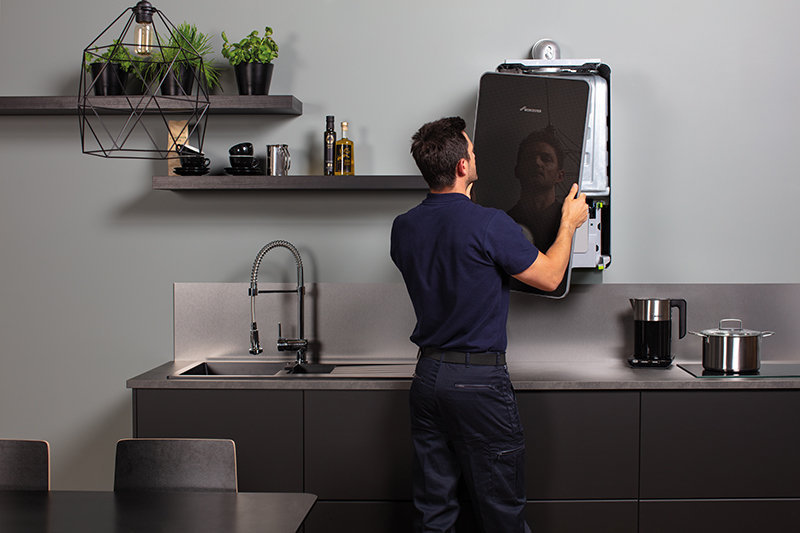
Martyn Bridges, Director of Technical Communication and Product Management at Worcester Bosch, discusses the role existing boilers can play to achieve decarbonisation goals.
Discussions around decarbonisation and net zero 2050 tend to focus on new technologies such as heat pumps and hydrogen solutions – but what about the systems in our homes already?
With around 6,000 natural gas boilers installed in homes across the UK every day, boilers are literally ‘the elephant in the room’ and must be addressed when we think about decarbonisation. No matter how advanced systems are in new-build properties, the question of existing homes and existing boilers poses a dilemma to the goal of net zero 2050 or at least the transition to net zero.
So how can existing boilers contribute to decarbonisation and adapt to low carbon before the likes of heat pumps and hydrogen boilers become the norm?
Misconceptions
Towards the end of last year in the long-awaited Energy White Paper, the government announced a future ban on gas-fired boilers, suggesting that hydrogen-ready boilers will be the only ones available on the market in the future.
However, largely thanks to sensationalist headlines which have misconstrued the intention of the government announcement, many consumers believe such a ban is already, or soon will be, in place. Indeed, from time to time, homeowners contact us to ask if it is illegal to have a replacement gas fired boiler in their home when their current one reaches the end of its life.
This is certainly not the case; the roadmap to a hydrogen switch in existing homes may have been laid out, but before these targets are reached, gas-fired boilers are here to stay in our homes. Before we reach any hydrogen switch, government plans to reduce carbon emissions from home heating systems and to start reducing one of the main emission sources.
Already ready
So, with these lower carbon goals in mind, how future-proofed are the boilers in our homes, or the ones you might buy tomorrow to fit into a customer’s home?
Perhaps surprisingly, the majority of boilers are already rather well equipped to contribute to these interim steps and carbon budgets. Any boiler installed since around 2000, including the ones on sale today, are actually future proofed to some degree as they can run on low carbon gas.
As an example, small amounts of bio methane are already being injected into the gas grid from hundreds of anaerobic digestion systems plotted around the country. These use waste material such as sewerage and treat it and cleanse it before injecting methane into the grid. So even today we are already using some form of biogas in people’s homes.
This means that before a wholescale switch to hydrogen, it will be possible to decarbonise home heating some more by using a blend of hydrogen instead of biogas. Indeed, just three weeks ago the Energy Minister announced in the House of Commons that as early as 2023 we may see the blend increase from the current level of 0.1% to a significantly higher level of up to 20%.
All boilers from around the year 2000, so any boiler you might be selling, buying, or fitting into someone’s home, are already suitable for this 20% blend – 80% methane and 20% hydrogen, and potentially some biomethane gas too. This means that when buying a boiler today, you are future-proofed for some years to come.
The near future
This intention to inject hydrogen into the grid in the interim has been confirmed and is already happening in numerous trial sites. For example, at Keele University, 150 boilers have been running on a 20% hydrogen blend successfully for the last two or three years.
Further sites will emerge throughout this year, such as in Winlaton where Northern Gas Networks will introduce a further 670 homes running on a 20% blend of hydrogen. It will reduce CO2 emissions by around 8%, which might sound small but is a very significant contribution to decarbonisation if every house in the country was treated the same.
Another more challenging trial will take place at a site in Fife, Scotland, where a hydrogen village of 300 boilers will operate on 100%hydrogen blend.
The end goal, of course, is to convert boilers on a hydrogen blend to 100% hydrogen, so I can appreciate that the lower carbon capabilities of gas-fired boilers do not fulfil the government’s ultimate intentions. Nonetheless, it is certainly a good contribution to decarbonisation whilst we wait for the infrastructure to be ready.
In summary, we can expect gas-fired boilers to stay for some time due to their suitability to lower carbon emissions before the country’s boilers become 100% hydrogen.













